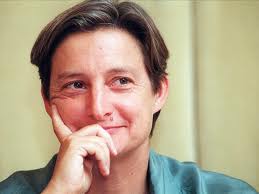Theory and direct action made-out in public this week when Judith Butler showed up to voice support of Occupy Wall Street at Zuccatti Park as reported on Feministing.
Feminist and queer theorist Judith Butler is currently a visiting Philosophy professor at the New School in New York. (Can I sneak into a class or something? Any New School readers, lemme know.) For a recap of her work, check out Julia’s Judith Butler 101 post published last year.

Judith Butler made a longer speech at NYC’s Washington Sq. Park and speaking through the people’s mic, Butler appealed to the power of the physical body in politics noting:
It matters that as bodies we arrive together in public. As bodies we suffer, we require food and shelter, and as bodies we require one another in dependency and desire. So this is a politics of the public body, the requirements of the body, its movement and its voice.
And the full transcript for Judith Butler’s Washington Square Park speech:
Hello everybody. I’m Judith Butler. I have come here to lend my support and offer my solidarity for this unprecedented display of popular and democratic will. People have asked, so what are the demands that all these people are making? Either they say there are no demands and that leaves your critics confused, or they say that demands for social equality, that demands for economic justice, are impossible demands, and impossible demands are just not practical.
But we disagree! If hope is an impossible demand, then we demand the impossible. If the right to shelter, food, and employment are impossible demands, then we demand the impossible. If it is impossible to demand that those who profit from the recession redistribute their wealth and cease their greed, then yes, we demand the impossible.
Of course, the list of our demands is long. These are demands for which there can be no arbitration. We object to the monopolization of wealth. We object to making working populations disposable. We object to the privatization of education. We believe that education must be a public good and a public value. We oppose the expanding numbers of the poor. We rage against the banks that push people from their homes, and the lack of health care for unfathomable numbers. We object to economic racism and call for its end.
It matters that as bodies we arrive together in public. As bodies we suffer, we require food and shelter, and as bodies we require one another in dependency and desire. So this is a politics of the public body, the requirements of the body, its movement and its voice. We would not be here if electoral politics were representing the will of the people. We sit and stand and move as the popular will, the one that electoral politics has forgotten and abandoned. But we are here, time and again, persisting, imagining the phrase, “we the people.” Thank you.
It’s stimulating to see an academic engaging with direct democracy in the streets but it’s not lost on me that Butler is teaching at the New School which has, to my mind, an outrageous tuition. ($1,645 (per credit).) I can’t imagine it will be long before there will be an academic panel dissecting the Occupy Wall Street phenomenon, so we will keep you posted!

